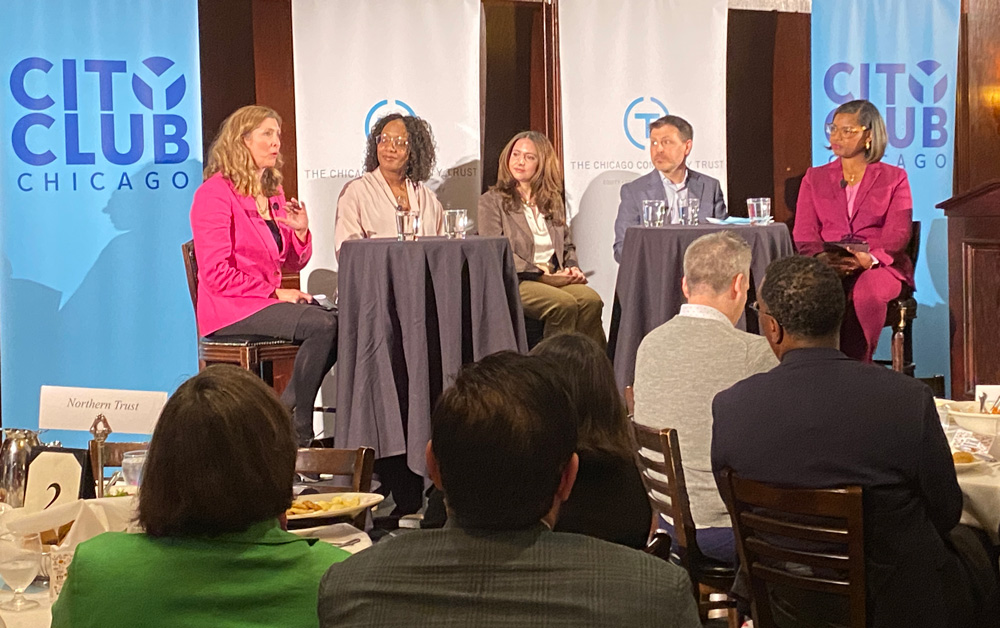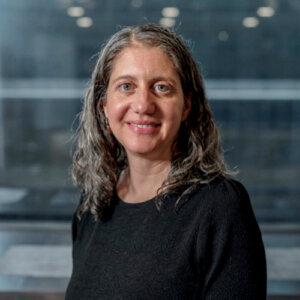MPC + We Rise Together
co-authored by Kendra Freeman, MPC Vice President of Programs and Strategic Impact
Mapping the journey of supporting small BIPOC business owners

On April 23, City Club of Chicago hosted a panel that featured Christen Wiggen of We Rise Together, Kendra Freeman of MPC, Andraya Yousfi of By the Hand Club for Kids, Kevin Goldsmith of JPMorgan Chase, and moderator Brandis Friedman of WTTW, Chicago Tonight (L-R). Photo credit: Chris Conley
When MPC was invited to partner with We Rise Together to support grantees leading construction projects in Black and Brown neighborhoods we didn’t just want to do another technical assistance project. We wanted this experience to inform how we think about systems change. We found a like-minded partner working with We Rise for the past three years to support responding to the deep-rooted economic inequities exacerbated by the COVID pandemic by providing capacity and resources to advance catalytic development projects.
Our work together has been as a thought-partner, co-designer, convener and facilitator. In 2022, we facilitated the We Rise Working Groups Initiative to bring together project leads from multiple developments in three single neighborhoods, anchored in Greater Chatham, Lawndale, and South Shore, in partnership with philanthropy, business, and civic leadership partners. Our aim was to create a container to learn, grow, and support one another with the understanding that the collective is stronger than the individual and small business owners, one-time developers, and especially BIPOC entrepreneurs who want supportive space to share experiences, frustrations, and accomplishments.
“The DPD representative in our working group gave me critical advice … [which] I’m glad I followed because I could have lost a lot of time and money. It would be amazing if we could figure out how to make sure all Black and Brown entrepreneurs and small business owners know the process exists.”
– We Rise Project Lead, 2022
While the cross-sector working groups focused on post-occupancy support was fruitful, we heard from every project lead that navigating the permit process presented the most challenges. In response, we surveyed all We Rise grantees to better understand the barriers projects were facing. This survey garnered a huge response rate and proved to be a pivotal moment in this process. We learned the nuances, depth, breadth, and shared challenging experiences of BIPOC project leads across the city. Listening to the working groups needs and reflecting on broader learnings, we pivoted to focus on technical assistance for projects in the construction phase of development, specifically the permit process and utility connection phases. We wanted to provide direct targeted resources which are often not accessible to community-based projects.
“Partnering with the Metropolitan Planning Council (MPC) as a We Rise Together grantee has been instrumental in navigating the intricate administrative landscape of our project. From facilitating communication with municipalities to serving as a liaison for essential connections, MPC’s support has been invaluable. They anticipated and addressed small yet tedious challenges that would have otherwise slowed our progress, demonstrating a deep commitment to our project’s success. Their proactive approach not only streamlined operations but also provided us with the confidence to tackle unforeseen obstacles head-on. Working with MPC has been a transformative experience, and I’m immensely grateful for their unwavering support in realizing our project’s vision.”
– We Rise Project Lead, 2023
MPC simultaneously created a journey map from the user perspective to map out the pain points in the permit process, specifically the Standard Plan Review. What we witnessed was that small business, especially on the South and West sides, have shared challenges in the development process, and are disproportionately affected by these barriers. These include the ability to budget for and recover from additional fees and significant delays, lack of staff capacity, diverted resources, securing flexible and sufficient funding, lack of support to navigate complex zoning and permit processes, and inconsistent and inefficient coordination and communication with the city.

To expand the journey map, click here.
We integrated our learnings from We Rise project leads, surveys, and journey map with the data and reflections from interviews done with practitioners, architects, business owners, and developers as part of a bigger project MPC is leading on assessing Chicago’s zoning practices through an equity lens. These combined voices from multiple users and stakeholders raising the development process as a significant barrier brought even more attention to this systemic problem and the disparate impact it has on Black and Brown businesses.
Seeing the work in real time and hearing direct experiences, feelings, and challenges gave us a perspective beyond data and research that directly informed and strengthened our analysis of the systems change work needed both in policies and practices. Over the past few months, MPC has had the opportunity to translate this work and analysis to broader tangible changes. We have been utilizing our learnings and analysis gained from our We Rise partnership to contribute to the city’s priority to reform the development process, specifically the Mayor’s Cut the Tape Initiative. We hope our impact is to make the process accessible and equitable to those most impacted by systemic barriers in community development.
